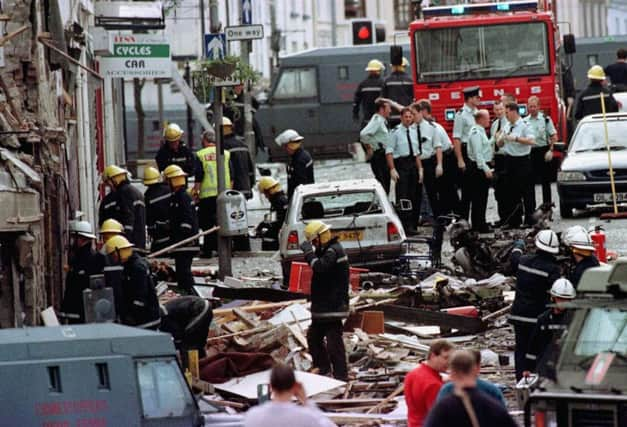Tom Peterkin: Omagh bombing case reminds us of troubled times


But it is not always appropriate, however, to make glib comparisons between the politics of Scotland and Northern Ireland. As the collapse of a court case illustrated this week, the bullet and the bomb have played a terrible role in that fractured province across the Irish Sea.
At a time when constitutional matters appear to be dominating European, British and Scottish politics, it was an unhappy reminder of the saddest and most destructive constitutional wrangle of them all.
Advertisement
Hide AdAdvertisement
Hide AdAlmost two decades after 29 people were murdered in the Omagh bombing, the case against the only remaining suspect collapsed in the most unsatisfactory circumstances.
Those campaigning on behalf of the loved ones they lost in the worst single atrocity of the Northern Irish Troubles reluctantly admitted they had probably seen their last chance of obtaining a criminal conviction.
It was poignant to see Michael Gallagher, who lost his teenage son Aidan at Omagh, reappear on our television screens making yet another dignified, yet pointed, statement describing how badly let down the victims have been. For most people on this side of the Irish Sea, the Troubles have been consigned to history. But that is far from the case for the thousands of families directly affected by them.
Michael Gallagher was one of the first people I rang when I went to work in Northern Ireland in 2005. Unfailingly polite and helpful, he commented on the breaking news that an electrician from South Armagh called Sean Hoey had become the first person to be charged with murder in connection with the atrocity.
Michael Gallagher was just as polite and helpful when asked to comment outside a Belfast court room around two and a half years later when Sean Hoey was acquitted. This week, he was still patiently dealing with journalists when prosecutors withdrew their case against Seamus Daly, a 45-year-old bricklayer who had been charged with the Real IRA massacre.
The case collapsed when it emerged there were crucial inconsistencies in the evidence of the key prosecution witness.
Beyond these two court cases, there have been civil actions and who knows how many false dawns in the attempts to catch the perpetrators.
A landmark civil case taken by the bereaved families saw four men, including Daly, sued for the bombing and ordered to pay £1.6 million in damages. The cash is still being sought.
Advertisement
Hide AdAdvertisement
Hide AdThe frustration has been all the more unkind, because this was a crime which – to use the local vernacular - “even the dogs in the street” thought they knew who was responsible.
Amid the headlines about botched investigations, evidence reliving the appalling carnage that unfolded on a quiet shopping day in 1998 and this week’s collapsed court case, Michael Gallagher has been a constant presence and determined seeker of the truth. The devotion with which he has maintained his vigil in honour of the memory of his late son is a vivid contrast with the evil that led to the death of his son and 28 others including unborn twins.